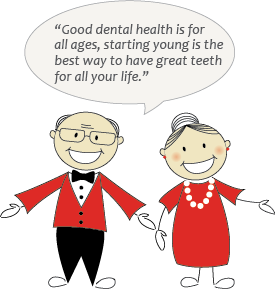Dental Health for Seniors
These days, more and more people are keeping their teeth for life. Healthy teeth and gums are just as important when you get older as they are when you're young.
Older adults are often faced with different types of dental problems. The good news is however, with regular dental care, you should be able to keep your teeth and gums healthy for life.
What dental problems could I fact as I get older?
Dry Mouth
As you get older you may find some prescribed medications, or an illness, may cause a reduction in your saliva flow, that will cause dry mouth. Saliva is important because it helps fight tooth decay by washing away the acids produced when plaque interacts with sugar. If you have a dry mouth, then your teeth become more susceptible to decay as a dry mouth can cause an increase in the incidence of gum problems.
The use of an artificial saliva replacement may help lubricate your mouth at mealtimes and can also be used between meals when you feel any discomfort from dry mouth.
Recession - "long in the tooth"
You have probably heard of the expression "getting long in the tooth". As many of us get older our gums start receding making the teeth appear longer. When your gums recede the root of the tooth is then exposed. Unfortunately, the roots of the teeth are not as resistant to tooth decay as the rest of the tooth. Decay that occurs on the roots of the tooth is knows as root caries. Your dentist can apply a fluoride treatment to make the roots of your teeth more resistant to decay.
Changes in eating habits
Some older adults adopt new eating habits that increase the frequency of consuming sugary food and drinks, eg. drinking sugared tea and coffee throughout the day. These habits can also have disastrous effects on the teeth, increasing the change of dental decay.
Wearing away of teeth
In some older adults, the appearance and function of teeth can suffer because of a continuous wearing away of the teeth. This can be the result of aggressive tooth brushing, using a hard toothbrush or using a very abrasive toothpaste. It is best that you see your dentist about this problem.
How can I help prevent these problems?
Use Fluoride
All surfaces of adult teeth, including the root surfaces need fluoride to help prevent tooth decay. Fluoride acts with minerals in the saliva to restore tooth surfaces damaged by the early stages of tooth decay and leaves surfaces more resistant to tooth decay.
Sometimes when I brush my teeth, my gums bleed. Is this normal?
If plaque is left on your teeth and along the gumline, the gums will become inflamed, swollen and red. This condition known as gingivitis and a tell tale sign is bleeding when brushing.
Gingivitis left untreated can lead to more serious form of gum disease called periodontitis. This disease leads to the destruction of the ligament and bone that hold the teeth in place. Unless treated, the teeth may become loose, fall out or require removal.
How can I prevent gum problems?
You may require dental treatment to help resolve your gum problems. Your dentist will be able to advise you about the most suitable brushing and flossing technique for you.
Clean your teeth and gums regularly
Regular brushing and flossing using a thorough technique will help prevent gum problems. Make sure that you use a soft toothbrush, together with a low abrasive toothpaste. If your teeth are sensitive, this may be reduced by using a toothpaste that is specially formulated to reduce sensitivity.
Some older adults may lose the dexterity required to thoroughly brush their teeth. Talk to your dentist to determine if adapting your toothbrush could help or if the use of an electric toothbrush is indicated.
What should I do if I feel any unusual lumps in my mouth?
It is important that if you feel any unusual lumps or swellings or have oral sores or ulcers that aren't healing, you should see your dentist without delay.
Your dentist is trained to examine your mouth to detect early signs of oral cancer.
Whether you have your own natural teeth or if you have dentures, you should visit your dentist on a regular basis, to have to the soft tissues of your mouth examined.
Source: Colgate Oral Care Brochure - Oral Care for the Older Adult


